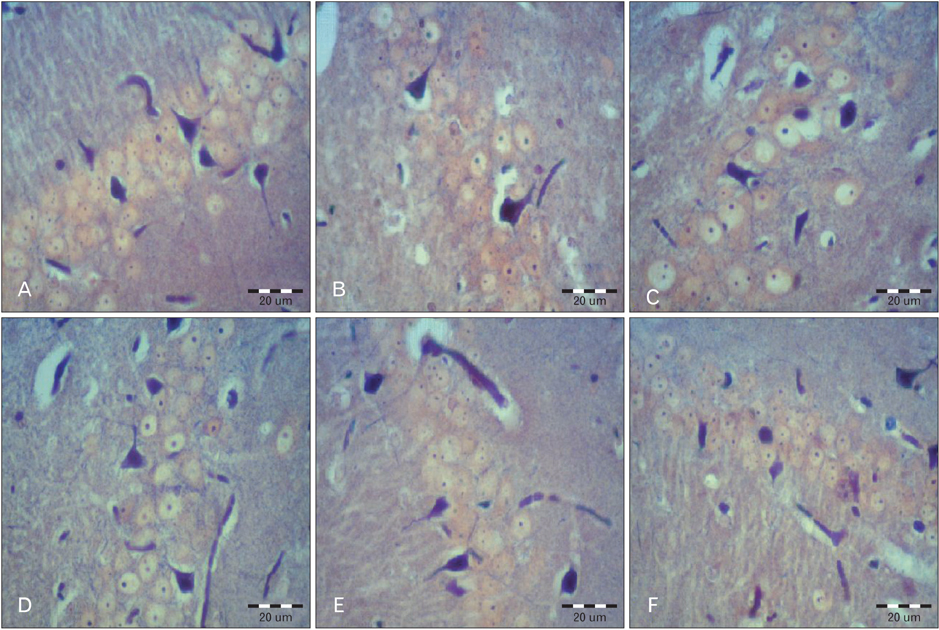Anat Cell Biol.
2012 Jun;45(2):92-96. 10.5115/acb.2012.45.2.92.
Protective effects of Ginkgo biloba extract (EGB 761) on astrocytes of rat hippocampus after exposure with scopolamine
- Affiliations
-
- 1Neuroscience Research Center, Department of Anatomy, Golestan University of Medical Sciences, Gorgan, Iran. mejahanshahi@yahoo.com
- 2Neuroscience Research Center, Golestan University of Medical Sciences, Gorgan, Iran.
- 3Golestan University of Medical Sciences, Gorgan, Iran.
- KMID: 2005871
- DOI: http://doi.org/10.5115/acb.2012.45.2.92
Abstract
- The regular extract of Ginkgo biloba has been shown to possess neuroprotective properties in disorders like hypoxia, ischemia, seizure activity and peripheral nerve damage. Also, G. biloba has received attention as a potential cognitive enhancer for the treatment of Alzheimer's disease, but there is not any documentation about the effect of an extract of G. biloba on astrocytes. Therefore, the aim of this study was examined the effects of G. biloba extract on the rat's hippocampal astrocytes after scopolamine based amnesia. In this study, 36 adult male Wistar rats were used. Rats were randomly distributed into control, sham, protective and treatment groups. The rats in the sham group only received scopolamine hydrobromide (3 mg/kg) intraperitoneally. The rats in the protective and treatment groups received G. biloba extract (40, 80 mg/kg) for 7 days intraperitoneally before and after scopolamine injection. Forty eight hours after the last injection, the brains of the rats were withdrawn and fixed with paraformaldehide, and then after histological processing, the slices were stained with phosphotungstic acid-haematoxylin for astrocytes. Data were analyzed by the analysis of variance (ANOVA) post hoc Tukey test; P<0.05 was considered significant. Results showed that scopolamine can reduce the number of astrocytes in all areas of hippocampal formation compared with the control. However, G. biloba extract can compensate for the reduction in the number of astrocytes in the hippocampus before or after the encounter with scopolamine. We concluded that a pretreatment and treatment injection of G. biloba extract can have a protective effect for astrocytes in all areas of hippocampal formation.
Keyword
MeSH Terms
Figure
Reference
-
1. Collerton D. Cholinergic function and intellectual decline in Alzheimer's disease. Neuroscience. 1986. 19:1–28.2. Lee B, Park J, Kwon S, Park MW, Oh SM, Yeom MJ, Shim I, Lee HJ, Hahm DH. Effect of wild ginseng on scopolamine-induced acetylcholine depletion in the rat hippocampus. J Pharm Pharmacol. 2010. 62:263–271.3. Das A, Shanker G, Nath C, Pal R, Singh S, Singh H. A comparative study in rodents of standardized extracts of Bacopa monniera and Ginkgo biloba: anticholinesterase and cognitive enhancing activities. Pharmacol Biochem Behav. 2002. 73:893–900.4. Williams B, Watanabe CM, Schultz PG, Rimbach G, Krucker T. Age-related effects of Ginkgo biloba extract on synaptic plasticity and excitability. Neurobiol Aging. 2004. 25:955–962.5. Ahlemeyer B, Krieglstein J. Neuroprotective effects of Ginkgo biloba extract. Cell Mol Life Sci. 2003. 60:1779–1792.6. Wang Y, Wang L, Wu J, Cai J. The in vivo synaptic plasticity mechanism of EGb 761-induced enhancement of spatial learning and memory in aged rats. Br J Pharmacol. 2006. 148:147–153.7. Mak YT, Chan WY, Lam WP, Yew DT. Immunohistological evidences of Ginkgo biloba extract altering Bax to Bcl-2 expression ratio in the hippocampus and motor cortex of sene scence accelerated mice. Microsc Res Tech. 2006. 69:601–605.8. Araque A, Parpura V, Sanzgiri RP, Haydon PG. Tripartite synapses: glia, the unacknowledged partner. Trends Neurosci. 1999. 22:208–215.9. Paxinos G, Watson C. The rat brain in stereotaxic coordinates. 1998. 4th ed. San Diego: Academic Press.10. Bancroft JD, Gamble M. Theory and practice of histological techniques. 2004. 5th ed. Edinburgh: Churchill Livingstone.11. Jahanshahi M, Sadeghi Y, Hosseini A, Naghdi N, Marjani A. The effect of spatial learning on the number of astrocytes in the CA3 subfield of the rat hippocampus. Singapore Med J. 2008. 49:388–391.12. Jahanshahi M, Golalipour MJ, Afshar M. The effect of Urtica dioica extract on the number of astrocytes in the dentate gyrus of diabetic rats. Folia Morphol (Warsz). 2009. 68:93–97.13. Smith JV, Luo Y. Studies on molecular mechanisms of Ginkgo biloba extract. Appl Microbiol Biotechnol. 2004. 64:465–472.14. Rocher MN, Carré D, Spinnewyn B, Schulz J, Delaflotte S, Pignol B, Chabrier PE, Auguet M. Long-term treatment with standardized Ginkgo biloba extract (EGb 761) attenuates cognitive deficits and hippocampal neuron loss in a gerbil model of vascular dementia. Fitoterapia. 2011. 82:1075–1080.15. Takuma K, Hoshina Y, Arai S, Himeno Y, Matsuo A, Funatsu Y, Kitahara Y, Ibi D, Hayase M, Kamei H, Mizoguchi H, Nagai T, Koike K, Inoue M, Yamada K. Ginkgo biloba extract EGb 761 attenuates hippocampal neuronal loss and cognitive dysfunction resulting from chronic restraint stress in ovariectomized rats. Neuroscience. 2007. 149:256–262.16. Mallet PE, Moore CA, Collie MT, Satvat E. Regional distribution of Ginkgo biloba-induced c-Fos immunoreactivity. Phytomedicine. 2009. 16:361–368.
- Full Text Links
- Actions
-
Cited
- CITED
-
- Close
- Share
- Similar articles
-
- Effect of Ginkgo Biloba Extract(EGb 761) on Apoptosis in Oral Cavity Cancer Cells
- An experimental study on the effect of Ginkgo Biloba extract (EGb 761) on the healing process after weak crush injury
- Effects of Ginkgo Biloba Extract on Experimentally Induced Hearing Loss by Noise
- Gingko biloba extract (EGb 761) attenuates ischemic brain injury-induced reduction in Ca2+ sensor protein hippocalcin
- The Protective Effect of Egb 761 Against 3-Nitropropionic Acid-Induced Hearing Loss: The Role of Sirtuin 1


